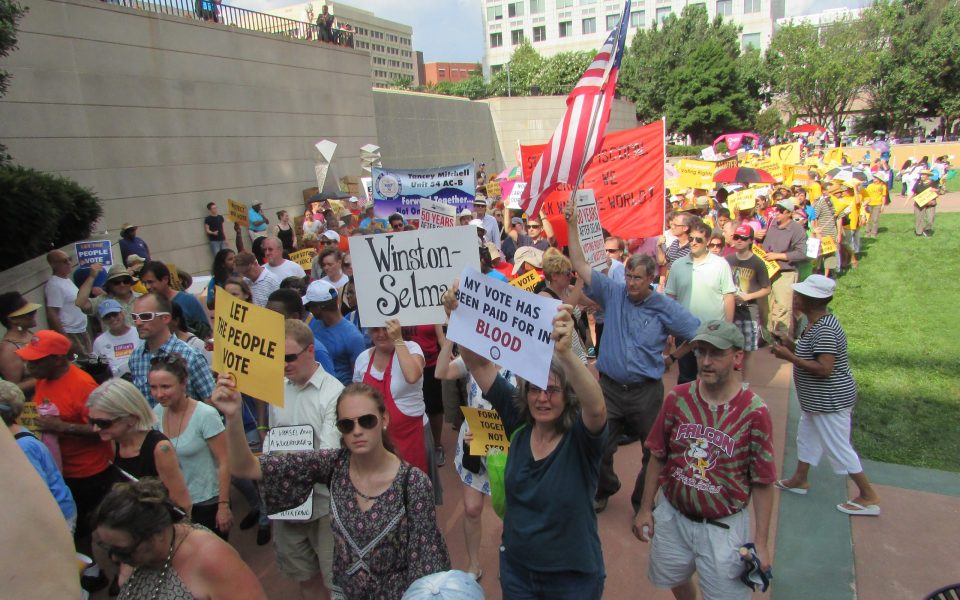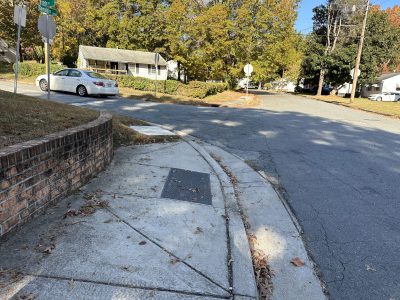by Jordan Green
Opponents of North Carolina’s “monster” voting law argued in federal court that the elimination of out-of-precinct provisional voting, cutting same-day registration and curtailing early voting imposes a disproportionate burden on blacks and Latinos as a historic trial began in Winston-Salem on Monday.
Gwendolyn Farrington, an African-American resident of Durham, testified in federal court in Winston-Salem on Monday that she had been working for a 72-hour-a-week job putting bolts in transmissions for AW North Carolina, a supplier for Toyota, during the 2014 election.
With limited time from when she finished work and picked two sons up from school on Election Day, she decided to vote at a polling place that was closer to work rather than her assigned precinct. She learned later that her ballot had been thrown out. She said her job simply did not afford her adequate time to drive across the county to vote at her assigned precinct.
“There’s almost zero flexibility,” Farrington said. “Any time off, twice, even being late to work twice you could be fired.”
Farrington was one of five African-American citizens who gave testimony about being disenfranchised in the 2014 election. They also included Dale Hicks, a Marine who relocated from Onslow County to Wake County to take an IT job at Apex Systems andneglected to update his voter registration; the Rev. Moses Colbert, a drug and alcohol counselor who found to his surprise that his voter registration did not go through when he updated his driver’s license after a move from Gaston to Cleveland County; Yvonne G. Washington, an elderly stroke and cancer survivor who walked for a half an hour with her husband to the nearest polling place, only to be told they were in the wrong precinct; and Carnell Brown, a retired sharecropper from Tarboro who voted in the wrong county.
The elimination of out-of-precinct provisional voting is only one feature of the 2013 omnibus election reform law, also known as the “monster” voting law, that the North Carolina NAACP, the US Justice Department, the League of Women Voters and other plaintiffs are seeking to overturn, along with the elimination of same-day registration and the curtailment of early voting from 17 to 10 days.
“The plaintiffs will show that the law unduly burdens low-income voters and results in discrimination because they have higher rates of transience, lower rates of education and lower rates of vehicle ownership, particularly burdening black voters,” Allison Riggs, a lawyer for the Durham-based Southern Coalition for Social Justice, pledged at the outset of the trial, which is expected to last about two weeks.
Opponents of the law, led by the North Carolina NAACP, have framed the federal case as a historic moment, and the first day of the trial drew civil-rights activists by the busload from as far east as Onslow County, while College Democrats from Watauga County in the state’s northwest corner also showed up to monitor the court proceedings. The day culminated with a rally at Corpening Plaza in the city’s downtown, attended by a crowd estimated by the Winston-Salem police at 3,500.
In response, lawyers for the state of North Carolina portrayed the provisions of the law as well within the mainstream, characterizing them as “majority rules.” Thomas Farr, lead attorney for defense, called the historic comparison to Selma “a pretty strong accusation,” adding that “nobody in this courtroom looks back at what happened in Selma without feeling disgust.”
He asked, “What is the dastardly thing that North Carolina has done? Eliminate out-of-precinct provisional voting? The state of New York has no out-of-precinct voting. Eliminate same-day registration? The state of New York has no same-day registration. Curtail early voting? The state of New York has no early voting.”
US District Court Judge Thomas Schroeder telegraphed his legal inclinations in a ruling in August 2014 on a preliminary injunction filed by the plaintiffs in the case. The trial for the preliminary injunction, in which plaintiffs had sought to suspend the new provisions for the 2014 election, took place in Winston-Salem exactly 12 months ago.
Schroeder said in his order that the plaintiffs had failed to demonstrate a likelihood of success in their suit. Schroeder’s order was reversed in part on appeal by the Fourth Circuit, only a month before the election. In a scorching rebuke, Judge James A. Wynn Jr. wrote that the lower-court judge had committed “grave errors” by failing to consider whether the law constituted retrogression, overlooking North Carolina’s history of voter suppression and considering each provision of the law separately instead of within a totality of circumstances. Contrary to Schroeder’s finding, Wynn said the plaintiffs are indeed likely to succeed on their claims.
Meanwhile, the lawyers for the state have indicated they plan to build their case on new facts that emerged with the 2014 election. They argued in court on Monday that the opponents’ claim that the new election law creates a racially disparate impact is undercut by the fact that participation among blacks increased in 2014.
The Rev. William J. Barber II, president of the state NAACP, sought to neutralize the argument during his testimony. Among other unique factors, he noted that Thom Tillis, then the speaker of the state House, was on the ballot that year. “People saw this as a chance to fight back against voter suppression,” he said. “One of the architects of the bill was up for election. The 12th Congressional District, one of the districts created to ensure black representation, had an open contest for the first time in decades. This was unprecedented.”
Join the First Amendment Society, a membership that goes directly to funding TCB‘s newsroom.
We believe that reporting can save the world.
The TCB First Amendment Society recognizes the vital role of a free, unfettered press with a bundling of local experiences designed to build community, and unique engagements with our newsroom that will help you understand, and shape, local journalism’s critical role in uplifting the people in our cities.
All revenue goes directly into the newsroom as reporters’ salaries and freelance commissions.





Leave a Reply